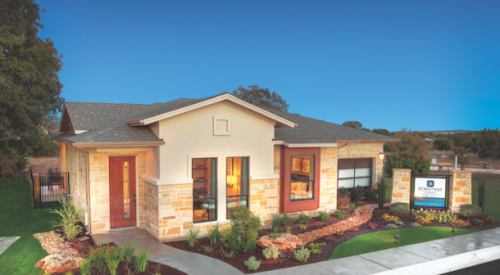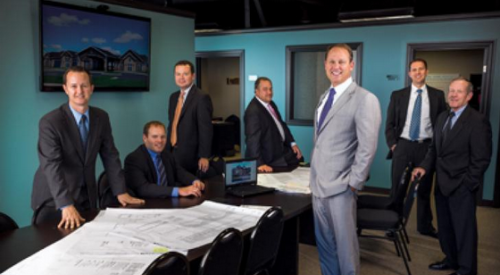Ideal Homes' Company Profile
Ideal Homes, Norman, Okla.
An entry-level and first-move-up builder serving the Oklahoma City metro area with 15 communities and five product lines ranging from 1,000 square feet to 3,250 square feet and priced between $110,000 and $320,000
Founded: 1990
2009 projected closings: 300
2009 projected revenue: $50 million
Customer satisfaction rate: 95%
Management Team: Vernon McKown, president of sales; Brian Rice, vice president of operations; JaRee Stambeck, CFO; Russ Gammill, vice president of purchasing; Gene McKown, president of development; Todd Booze, president of construction
Talk with Gene McKown and your conversation will be spiked with terms such as leverage ratio and non-recourse financing. These are surprising terms for a self-described “poor country boy” who is a charity auctioneer, graduated with a degree in agriculture and was raised on a dairy farm in Oklahoma. But they’re also the language of one of the three owners of Ideal Homes, Professional Builder’s 2010 Builder of the Year. In partnership with his son Vernon McKown and Todd Booze — Vernon’s best friend from college — the three men have built a quiet dynamo in Norman, Okla., serving the entry-level market and first move-ups with a smart blend of quality assurance, customer satisfaction and energy efficient housing.
There’s a reason McKown speaks so comfortably in such language. He has served on the board of directors of a bank, owned in his younger years a huge real-estate brokerage firm and was commissioner of the Oklahoma Department of Commerce. Financial terms are his language of choice. But for Ideal Homes the words of finance are writ deeper than that, and they represent the discipline that underpins the company. Let McKown explain why. “I had saved $10 million by the time I was 40,” he says, “and between age 40 and 44 I lost it all, and lost my home and went through bankruptcy.”
An event like that will change a man. In this case, an event like that will be the reason Ideal Homes is surviving this recession and earning our top honors. Here’s how.
Financial Foundation
As Gene emerged from bankruptcy (within 5 years, he had settled all his debts), he went into partnership with Vernon and Todd, who were just emerging from college. The two young men had built two houses in their senior year, Vernon held his Realtor license and the three of them became equal partners in Ideal Homes. At the outset, there were some unique elements to the company designed to prevent the kind of mishap that had befallen Gene previously. The partners agreed to a covenant that none of them could hold any personal debt. No credit card debt. No car loans. No mortgages.
Among other constraints are keeping leverage ratios for the home building company at 2:1 and for the land company at 1:2. They have almost no debt on land and their goal is to have no debt on specs. In today’s market, part of the reason for those low ratios is the lack of capital. Banks just don’t want to lend — or can’t — and Ideal Homes has always grown from reinvestment of capital into the company.
Having Gene sit in the office is also a visible reminder to the younger men that home building entails plenty of downside. “We feel like we have enough at risk from stuff we’re partners in,” Gene says, “that we don’t need to be out here borrowing money and doing foolish things on our own.”
In its first year, 1991, Ideal Homes sold 27 houses. In its second year, they sold 97, and in the third 115. From the beginning, duties were divided among the three owners in the same way they are today. Gene McKown is president of development; Vernon McKown, president of sales; and Todd Booze, president of construction.
The fiscally conservative management has probably constrained Ideal Homes’ growth a bit, but it has delivered other benefits. Says Gene: “We have been really fortunate for 20 consecutive years to take our 10 percent discounts every month without fail.”
Culture of Discipline
Building a company on the rock-solid foundation of financial control while helping to stave of failure does not guarantee success.
Success requires a company culture that is devoted to improvement. At Ideal Homes, that quest is more mundane than quixotic. “I think everybody looks for the silver bullet in design or whatever’s fancy — how they can set themselves apart from other people,” Todd Booze says. “Yeah, you’ve got to do some of that, but it really comes back to the basic fundamentals of building houses. You just keep trying to get better. It’s an attitude of trying to help everyone around you get better — our trades and our vendors and our customers. We’re building quality of life for all these people and helping their businesses grow. If we’re doing that, we’re going to get where we want to be.”
Any conversation with the owners and managers invariably leads to discussions of luck. “A rising tide raises all boats,” says Vernon. And the culture of the company fits that modesty, where employees are sought out and encouraged to just keep their heads down and do the work. A lot of people talk about how their most important asset is their people. The Ideal Homes owners and managers put the truth to that statement.
After their initial growth period, the owners and managers of Ideal Homes recognized they were doing okay, but not doing as well as they should. So, in 1997, when they were building about 200 houses a year, they brought in Chuck and Emma Shinn of Shinn Consulting of Littleton, Colo., for a two-day audit. “We’re expecting this glowing report card. 'Aren’t you guys a bright shiny penny?’” says Vernon. “Chuck starts off nice and sweet, and then says, 'I’m really glad I got to come down to meet you guys. You’re a bunch of really nice guys, and I’m glad I got a chance to meet you before you go broke.’”
To this day, Ideal Homes has the 32-point performance benchmarks Shinn laid out for them still posted on the board of their conference room — laminated. And they began working on improving their performance in each of those 32 areas.
Turning to outside experts for help didn’t start with Shinn, and it certainly didn’t end there. (See sidebar, “The Outsiders.”) They have hired a Boy Scout troop’s worth of consultants to help them improve and refine every process, from building healthy houses to tightening sales procedures to establishing improved trade relations. The concept is simple. Why invent something that is already invented.
Probably the best example of a discrete process within Ideal Homes that uses this idea is the hiring process. Vernon reports that turnover was higher than they wanted, and they recognized that they needed to address the hiring process. In 2000, the company began a new hiring process based on the book, “Topgrading: How Leading Companies Win by Hiring, Coaching and Keeping the Best People,” by Bradford D. Smart. Every hire is an 11-step process that begins with the hiring manager’s completing a requisition form and ends with the New Hire Orientation. Under each step are bullet points, describing who is responsible for which action.
Most notable, though, is the interview process, Step No. 5. It is further broken down into four steps: pre-screen interview, work history interview, competency-focused question interview and in-depth reference check interview. Just one of those steps — the competency focused question interview — involves a series of five people interviewing every candidate for every position from truck driver to vice president. “We’ll spend five hours with them,” says Booze, “literally interviewing them on certain competencies that we’ve identified as being important.”
The result of this effort is not a Stepford-type team that marches in identical lock stop. A key component for Ideal Homes is to identify varied personalities and viewpoints to make a more complete team.
Once on board, team members find considerable benefit through the company profit sharing plan. “We dole out a point and half to two points of our net profit out in the form of profit sharing,” says Vernon.
That wherewithal comes from efficiencies gained from implementing systems and process that moved the bottom line a couple of points and the top gross margin several points as well.
Leadership in Energy Efficiency
All of the Ideal Homes people talk about how what they do is basic block and tackling. They look outside their company for people who do things better, and then they use their ideas. It is a modesty that should be admired. But in one area, they are at the forefront. In terms of building energy efficient houses, Ideal Homes is setting industry standards. Current Ideal homes deliver 36 percent below the code-built house on energy performance, which is at a level twice as efficient as Energy Star standards. Vernon believes 50 percent below code is just around the corner. “We’re not spending a ton of money. Every year we ask ourselves, 'What would it cost us to strip all the energy performance out of the house?’ You’re talking $3,000. What customer in his right mind wouldn’t spend $3,000 to save $1,000 a year?”
It was that sense of what the customer wanted that started Ideal Homes down the road to energy efficiency. It began innocently enough, when their HVAC contractor approached them about installing SEER 10 systems when most of the competition was using SEER 8. That simple change allowed Ideal Homes to market their homes as more energy-efficient, which became a differentiator. “We started telling customers our houses come with a SEER 10 air conditioner that operates for 25 percent less,” says Vernon. “We told somebody to pay me an extra $250 and save 25 percent on your air conditioning bill, and they all bought it. And we were kicking the other guy in the pants.”
That lasted for most of the ’90s, until they learned about Energy Star in 1996, when they began adding other elements of energy efficiency such as tightening the envelope. From then on, every home they built met Energy Star standards. Further refinements followed, including building a Healthy House demonstration home, but the competition was following hard on Ideal Homes’ heels. In fact, today more than 60 percent of the permits in the Oklahoma City market are for Energy Star homes. “We have a huge penetration here,” says Vernon. “And I’d like to think that Ideal Homes has a lot to do with that, because we were the first adopters out there in Oklahoma and we pushed the message so hard that all the other builders had to introduce Energy Star in their products just to compete with us.” That is the effect of an industry leader. They create competition and help build new markets and new demands among consumers.
To differentiate further, Ideal Homes moved toward guaranteed utility bills. Delivering on such a promise requires a company to have the kinds of quality control processes in place that Ideal Homes does. Without the great relations with the trades and clear communication, delivering on such a guarantee can only lead to broken promises. “It’s just a son-of-a-gun to execute,” Vernon says. “If you don’t have a company that’s systems-driven on your execution in the field, your processes on how you build your houses, you cannot build performance.”
Since then, Ideal Homes has taken on the Department of Energy Builders Challenge and constructed one of the first Zero Energy Homes by a production builder for the entry-level market. That house, featured in the May 2006 Professional Builder, sold for $195,000.
It’s not a coincidence that it's the president of sales who is one of the main drivers behind the push for energy efficiency in Ideal Homes. In fact, Vernon served as president of the Energy and Environment Building Association (EEBA) for two years. Todd Booze is also on the board of the association. This two-pronged attack, a drive to differentiate in the market based on energy efficiency and an ability to control production to such tight degree that the company can deliver on promises is what sets Ideal Homes apart and brings in buyers. As Vernon says, “In housing, the only metric we’ve given customers is price per square foot. ... But when you introduce this energy piece into the equation, you begin to give them a [new] alternative. It just goes to show you how smart customers are. When you give them another valuable metric to evaluate something with they’ll use it. … What I tell everyone who comes here is, 'We use energy efficiency to give customers a logical reason to make an emotional decision.’”
Market Performance
In spite of all the great things Ideal Homes does, there is a final arbiter in their ability as a home building company. Do they sell homes? The answer is yes, but it is a muted response as is appropriate for the current market. At their peak, the company closed 525 homes in 2006. In 2009, they project to close 300 homes, which is about even with 2008 closings. Twenty-five percent of their sales are to buyers who qualify for the first-time home buyer tax credit.
The company did have to do a reduction in force in the fourth quarter of 2008, the first ever in company history, and meager by current industry standards. But even that awkward moment is perhaps the most telling indication of the quality of the company. Every year, the owners and managers engage in a very detailed strategic planning process that includes identifying worst-case scenarios. Last year, they benchmarked 60 home sales in a quarter as an acid test. In the fourth quarter, when Ideal Homes only closed 47 homes, the owners and managers recognized that to keep the company viable, they needed to cut costs. The hard decision? Reduce the workforce by 20 percent.
We recognize Ideal Homes for their ability to deal with the hard realities of a unique market; their ability to project, benchmark and execute the right decisions; their ability to create a business model that protects them from the worst the market has to offer; and their ability to lead the industry in an absolutely crucial area of energy efficiency. We’re proud to proclaim it the 2010 Professional Builder Builder of the Year.
Ideal's Path to Energy-Efficient Homes
1991: Install Seer 10 HVAC system against the market standard of SEER 8
1996: Build first Energy Star home
1997: Build Health House demonstration home
1999: Join Department of Energy Building America program
2000: Begin participation in LP Engineer for Life program and later switch to Masco Environments for Living program
2000: Start guaranteeing utility bills for heating and air conditioning
2000: Vernon McKown is Board President for the Energy and Environment Building Association for two years
2005: Build Zero Energy demonstration home
2008: Adopt Department of Energy Builders Challenge
The Outsiders
One of the great things about quality organizations is that they don’t pretend to know everything. They also engage in active learning. Owners and managers of Ideal Homes read one management book every quarter, and the company has made a habit of turning to people who are experts in their areas. Any conversation with an owner, manager, or employee will scare up a reference to a book or an outside expert.
Books
“Master the Rockefeller Habits: What You Must Do to Increase the Value of Your Growing Firm” — Verne Harnish
“The Great Game of Business” — Jack Stack
“Good to Great: Why Some Companies Make the Leap ... and Others Don’t” — Jim Collins
“Topgrading: How Leading Companies Win by Hiring, Coaching and Keeping the Best People” — Bradford D. Smart
Consultants
Chuck and Emma Shinn, Shinn Consulting Group — performance management
Steve McGee, Unify International — trade relations
Carol Smith — customer satisfaction
Woodland, O’Brien, Scott — customer satisfaction
Paul Cardis, Avid Ratings — customer satisfaction
Troy Schrock, Gazelle Group — strategic planning
Kelly Parker, Guaranteed Watt Savers — energy efficiency
Sam Rashkin, National Director of Energy Star — energy efficiency
Kathleen Guidera, Health House Advantage, now Executive Director of EEBA — healthy houses
Mark LaLiberte and Building Better Homes — building sciences
Joe Lstiburek — building sciences
Bartell & Bartell — personality testing












